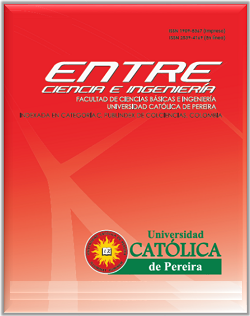Episteme vs. Tekné: an approach to the learning of computer programming in Systems Engineering
DOI:
https://doi.org/10.31908/19098367.4013Keywords:
Computers, episteme, learning, programming, tekné.Abstract
This article exposes the results of a research made in the classroom looking for establishing elements of comparative judgment that would allow comparing two teaching strategies, and their impact on learning, of computer programming in a Systems Engineering program. The two strategies to be compared consist of the teaching of the logic of programming (the episteme) or the teaching of its application reflected in a programming language (tekné). In order to measure the impact of the two strategies on the learning of programming, Programming I courses were divided into two subgroups so that a comparative follow-up could be carried out permanently. The process was carried out with the 1st semester of Systems Engineering of a public university. The results were measured quantitatively from identical written evaluations and under highly similar conditions for their resolution. A qualitative approach was also made based on the opinion of the students at the end of the course. It is concluded that the teaching of the episteme of programming seems to be much more relevant than its application since the student can go from the 1st to the other. However, there were cases in which some students, from the study of the programming language, were able to infer the underlying concepts of the relevant logic.
References
Blanchard, B. System Engineering Management. 4th Ed. New York : Wiley Publish, 2008.
Bisquerra Alcina, R. Metodología de la investigación educativa. Madrid (España) : Editorial La Muralla S. A., 2004.
Ballester Valori, A. Meaningful Learning in practice. Islas Canarias : Universitat de les Illes Ballears, 2011.
Campillay S.; Meléndez N. Análisis de impacto de metodología activa y aprendizaje heurístico en asignaturas de ingeniería.. vol. 15 núm. 22, Actualidades Investigativas en Educación, DOI: 10.15517/AIE.V15I2.18950
Small, G. Digital Brain. Barcelona : Urano, 2009. p. 254.
Van Roy, P. and Haridi, S. Concepts, Techniques, and Models of computer programming. Boston, USA : MIT Press, 2004. p. 936.
Ministerio de Educación Nacional. Estandares básicos de competencias en matemáticas. Bogotá : MEN, 2005.
Tlili, Ahmed, Essalmi, Fathi y et al. Role of personality in computer based learning., Computer in Human Behavior, 64, 2016 págs. 805 - 813.
Kline, M.. El pensamiento matemático. De la antiguedad a nuestros días. Madrid : Alianza Editorial, 2012.
Acosta Flores, J. Ingeniería de Sistemas: Un enfoque interdisciplinario. Ciudad de México : AlfaOmega Grupo Editor, 2003.
Boyer, C. Historia de la Matemática. Madrid : Alianza Editorial, 2010.
Strogatz, Steven. The joy of x: from One to Infinity. London : Mariner Books, 2013.
Aczel, A. Cuaderno secreto de Descartes. Madrid : Biblioteca Buridan, 2013.
Rey Babini, J. y Pastor, J.. Historia de la Matemática Vol. II. Buenos Aires : Gedisa, 2013.
Stewart, I. The story of mathematics. London : Quercus Publishing, 2009.
Jiménez Murillo, J.. Matemáticas para la computación. Buenos Aires : Alfaomega, 2014.
Trejos Buriticá, O. I. Lógica de Programación. Bogotá : Ediciones de la U, 2017.
Trejos Buriticá, O. I. Programación Imperativa con Lenguaje C. Bogotá : ECOE Ediciones, 2017.
Chukaew, Sasithorn, Panjaburee, Patcharin y et al. A personalized e-learning environment to promote students conceptual learning on basic computer programming. 2014, 5th World Conference on Educational Sciences, págs. 815 - 819.
Medina, J. Los 12 principios del cerebro. Bogotá : Grupo Editorial Norma, 2010.
Orozco Gomez, G. TvMorfosis. México D. F. : Tintable, 2017.
Levy, P. CyberCulture: Electronic Mediations. New York : University of Minnesota Press, 2001.








 Revista Entre Ciencia e Ingeniería
Revista Entre Ciencia e Ingeniería .png) entrecei@ucp.edu.co
entrecei@ucp.edu.co.png) ISSN (Impreso) 1909-8367 - ISSN (En Línea) 2539-4169
ISSN (Impreso) 1909-8367 - ISSN (En Línea) 2539-4169 Attribution-NonCommercial 4.0 International (CC By-NC 4.0)
Attribution-NonCommercial 4.0 International (CC By-NC 4.0)
.png) Carrera 21 No. 49-95 Av. de las Américas, Pereira, Risaralda, Colombia
Carrera 21 No. 49-95 Av. de las Américas, Pereira, Risaralda, Colombia